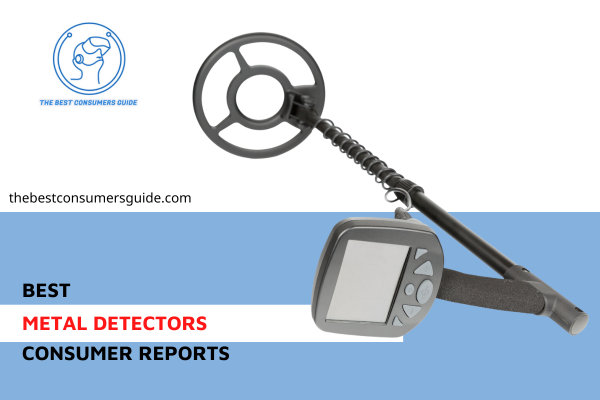Looking for the best metal detector in 2025? Whether you’re a beginner treasure hunter or an experienced detectorist, choosing the right device makes all the difference. This updated guide based on consumer reports and user feedback showcases the top-rated metal detectors for various needs—from coin hunting to gold prospecting and underwater detection.
Best Metal Detectors Consumer Reports – Top Picks for 2025(Update)
Below is the list of top Metal Detectors that you can have a look at and buy. Check one by one carefully before purchasing:





*Note: Score is based on our AI score (Editor’s choice and rating)
Quick Overview – Top 5 Best Metal Detectors (2025)
| Product | Type | Best For | Key Features |
|---|---|---|---|
| Garrett ACE 400 | VLF | All-purpose | Iron audio, digital target ID, lightweight |
| Minelab Equinox 800 | Multi-frequency | Professional use | Waterproof, wireless audio, gold mode |
| Fisher F22 | VLF | Beginners | Weatherproof, 10 sensitivity levels |
| Nokta Makro Simplex+ | VLF | Mid-range users | Waterproof, LCD display, budget-friendly |
| Bounty Hunter TK4 Tracker IV | VLF | Budget pick | Analog control, rugged design, easy to use |
1. Garrett ACE 400 – Best All-Around Metal Detector🥇
The Garrett ACE 400 is highly recommended by hobbyists and professionals alike. It features a 10 kHz frequency, iron audio for better discrimination, and a digital target ID for more accurate readings.
Pros:
-
Lightweight and easy to handle
-
Great depth detection for coins and relics
-
Adjustable frequency and five search modes
Perfect for: Relic hunting, coin shooting, and beginners looking for serious performance.
2. Minelab Equinox 800 – Best High-End Multi-Frequency Detector
If you’re serious about treasure hunting, the Minelab Equinox 800 is a game-changer. It supports multiple frequencies simultaneously and is fully waterproof up to 10 feet.
Key features:
-
Multi-IQ tech for simultaneous frequency scanning
-
Custom search profiles
-
Built-in Bluetooth and wireless audio
Perfect for: Gold prospectors, beach hunters, and deep searching.
3. Fisher F22 – Best for Beginners
The Fisher F22 is one of the most user-friendly metal detectors on the market. It offers preset modes, a weatherproof design, and fast recovery speed.
Why it’s great:
-
4 search modes (Jewelry, Coin, Artifact, Custom)
-
Lightweight and affordable
-
Excellent battery life
Perfect for: Entry-level users and teens getting started.
4. Nokta Makro Simplex+ – Most Affordable Waterproof Detector
The Simplex+ offers professional-level features at a fraction of the price. It’s the only waterproof detector in its price range that includes a full backlit LCD screen.
Notable features:
-
IP68 waterproof rating
-
Vibration feedback and LED flashlight
-
Firmware updates via USB
Perfect for: Budget-conscious users who still want modern tech.
5. Bounty Hunter TK4 Tracker IV – Best Budget Pick
A proven entry-level model, the TK4 Tracker IV is durable and effective for basic metal detecting. It uses analog controls, making it easy to learn.
Strengths:
-
Three-mode operation
-
Rugged construction
-
Great value for under $100
Perfect for: Beginners and casual users.
What to Look For in a Metal Detector
-
Frequency: Higher frequencies for small targets like gold; lower frequencies for deep objects.
-
Ground Balance: Adjusts for mineralization in soil.
-
Discrimination: Helps ignore unwanted metals like iron.
-
Target ID: Digital display to identify metal type.
-
Coil Type & Size: Larger coils cover more area but may miss small objects.
-
Waterproofing: Important for beach or underwater use.
Who Should Use a Metal Detector?
-
Coin Hunters: Look for devices with good discrimination and depth.
-
Beachcombers: Choose waterproof detectors with saltwater tolerance.
-
Gold Prospectors: Prefer higher frequency models or pulse induction.
-
Relic Seekers: Need detectors with high sensitivity and iron audio.
Benefits of Metal Detectors
One of the most obvious benefits is that it can help you find lost items. If you’ve lost a valuable piece of jewelry or another item, a metal detector can help you find it.
Metal detectors can also be used for security purposes. If you’re worried about someone planting a bomb or other type of explosive, a metal detector can help you find it.
Another benefit of metal detectors is that they can be used for treasure hunting. If you’re interested in finding buried treasure, a metal detector is a must-have.
Finally, metal detectors can simply be fun to use. If you enjoy spending time outdoors and exploring, a metal detector can add an extra element of excitement to your outings.
If you’re on the fence about purchasing a metal detector, consider all of the benefits that it can offer. It’s an investment that can definitely pay off in the long run.
Final Thoughts
Choosing the right metal detector depends on your goals, terrain, and experience level. Whether you’re metal detecting in your backyard or exploring riverbanks, our Best Metal Detectors Consumer Reports guide helps you make an informed choice.
💡 Start with a beginner-friendly model like the Fisher F22 or Bounty Hunter TK4, and upgrade to advanced models like the Equinox 800 as you gain experience.
FAQs
How deep can a metal detector go?
The depth at which a metal detector can detect an object depends on several factors, including the size of the object and the type of metal. Some models are more sensitive than others and can detect smaller objects at greater depths. If you’re looking for a metal detector that can find buried objects, you’ll want to choose a model with good depth capacity.
What is the best frequency for a metal detector?
The frequency of a metal detector can affect its performance. Higher frequencies are usually better for finding smaller objects, while lower frequencies are better for finding larger objects. Most metal detectors have a frequency between 3 and 30 kHz.
What is discrimination on a metal detector?
Discrimination is a feature that can help the metal detector ignore certain types of metal. This can be helpful if you’re only interested in finding certain types of objects. However, discrimination can also make it more difficult to find small objects. If you’re looking for a metal detector that can find a wide range of objects, you may want to choose a model without discrimination.
What is ground balance on a metal detector?
Ground balance is a feature that can help the metal detector ignore minerals in the ground, which can interfere with its ability to find objects. Some models have automatic ground balance, while others require you to manually adjust the setting. If you’re going to be using the metal detector in an area with a lot of minerals in the ground, you may want to choose a model with this feature.
What is pinpoint mode on a metal detector?
Pinpoint mode is a feature that can help you locate an object more precisely. This can be helpful if you’re trying to find a small object in a large area. Some models have this feature, while others do not. If you think you might need to use pinpoint mode, you may want to choose a model that has it.
What should I look for in a metal detector?
When choosing a metal detector, there are several factors you should consider, including the type of objects you’re looking for, the features you want, and the price. If you’re looking for a metal detector that can find a wide range of objects, you may want to choose a model with good depth capacity and discrimination. If you’re looking for a metal detector that is easy to use, you may want to choose a model with good battery life and an easy-to-read display.
I’m Georgie Barton, a reviewer for various magazines . I’ve been testing and writing about household products and electronics for years, and have become quite the authority on the subject. My goal is to help people make informed decisions when purchasing these items, so they can get the most value for their money.
My hope is that through my work, everyone will be able to find a quality and satisfactory product. Thank you for reading!

